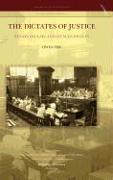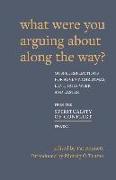The Dictates of Justice. Essays on Law and Human Rights
BücherAngebote / Angebote:
Human Rights Series, 1 (Library of Human Rights, 1) In 1985, Owen Fiss was called to Argentina to advise its President, Raúl Alfonsín, and his administration on the trials that the country was then conducting to hold its military accountable for human rights abuses. From this experience, his perspective on human rights was changed. Fiss came to see human rights as universal social ideals that were also deeply rooted in the country's processes of national selfdetermination. This was an idea that would shape a generation of his thinking. In this book, the perspective that Fiss extracted from his experience in Argentina is brought to bear on some of the most vexing human rights issues in the modern world. A commitment to the processes of national self-determination so central to the Argentine human rights trials leads Fiss to cast a critical eye on the turn to international tribunals that tends to supplant national efforts to adjudicate human rights claims. Fiss also produces a vision of how states engaged in the transition from dictatorship to democracy, as Argentina was in the mid 1980s, can protect human rights through civil, not just criminal, proceedings. The Argentine experience also prompts him to search for the right degree of independence that judges are to have from the other, more political, branches in the transition to democracy. Fiss also takes on the human rights issues posed by the fi ght against terrorism in the post-9/11 era and once again tries to frame those issues within the terms of national law. The reasoned and humane decisions of Aharon Barak, former President of the Israeli Supreme Court, are taken by Fiss as models of how a nation dedicated to human rights can confront terrorist threats. Against this example, Fiss explores how Presidents George W. Bush and Barack Obama put in jeopardy, and sometimes transgressed, a number of principles that had long been part of the American constitutional tradition and that had allowed the United States to speak proudly and boldly about human rights. Throughout all of these essays, Fiss connects the ideals of human rights with the dictates of justice and with characteristic clarity and moral force draws out an encompassing theory of what both require. At times critical, at other celebratory, this book confronts many of the world's most challenging human rights issues and offers a vision of what a law faithful to the ideals of human rights could be. Table of Contents 1. Human Rights as Social Ideals 2. The Right Degree of Independence 3. The Autonomy of Law 4. Within Reach of the State 5. The Awkwardness of the Criminal Law 6. Law is Everywhere 7. The Example of America 8. Imprisonment without Trial Index Acknowledgements About the Author(s)/Editor(s) Owen Fiss is Sterling Professor of Law at Yale University.
Folgt in ca. 15 Arbeitstagen




